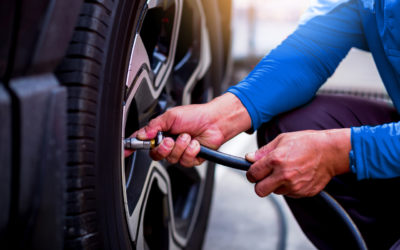Keeping Your Engine from Overheating in Summer Temperatures

While winter weather can make for tricky and even treacherous driving, summer can be just as dangerous. It’s relatively easy for an engine to overheat, especially when sitting in bumper to bumper traffic on sweltering days. Regular, ongoing maintenance will go a long way to preventing a breakdown, but there are a few things you can do before you hit the road and while you’re driving to keep your engine functioning properly.
Pre-Trip Inspection
- Radiator System: Make sure your radiator cap isn’t cracked and that the seal is in good condition. Check that hoses and lines are free from corrosion. Hoses in particular are often overlooked, but because they are rubber, they can crack, leak and rot over time. A broken hose, for instance, will prevent fluid from getting to and from the engine correctly.
Note: Remember never to touch or try to remove the radiator cap before the engine has fully cooled.
- Coolant: Not only do your coolant levels need to be sufficient, but the coolant to water ratio also needs to be correct. Truck manufacturers provide guidelines for the appropriate coolant-to-water mixture. Coolant should also be free from debris or dirt, so inspect it visually as well. Not all coolants are the same, so when topping off be sure you are not mixing two different kinds or old with new. Coolants come in a range of colors now, typically signifying different boiling points. Mixing them could impact the performance of your engine.
- Engine Oil: Engine oil is just as important for keeping your engine cool and working properly as coolant and water. Always make sure engine oil is at the proper level.
- Leaks: Some leaks are obvious, and you can tell by the location of the puddle under your truck as well as the color or smell of the liquid what it might be. Other leaks might not make themselves known with a puddle – so check hoses and lines for cracks, breaks or leaks.
- Belts: Like hoses, belts are rubber and can wear out over time – but summer temperatures can put even more strain on them. They are a critical component for running many systems in an engine, including the fan and water pump.
On-the-Road
- Keep Speed Down: Driving too fast can make a truck overheat, especially when hauling heavy loads. Drive slowly and take breaks often to let the system cool off.
- Periodic Checks: Check water and coolant temperatures as you go as well as engine oil and coolant levels. If you have an oil temperature gauge, make sure the oil temperature stays within the range it needs to as you’re driving.
If you do run into problems on the road – whether an overheated engine or any other issue – make sure to download the FYX Driver App for immediate access to FYX service providers. Our innovative FYX platform streamlines communications and monitors service in real time for faster repairs and minimized downtime.
For more information, please contact FYX: 800-888-1001 | sales @fyxfleet.com

GET STARTED WITH FYX
RECENT POSTS
What You Need to Know About Truck Tire Pressure as the Seasons Change
It is common knowledge that colder temperatures can cause tire pressure to go down – and the result, left unchecked, can be costly. Underinflation of just 10% can shorten the lifespan of tires, lower fuel efficiency and cause uneven tread wear – all of which can...
FYX Partners with Convoy to Launch TruckYeah Savings Program
As we celebrate the National Truck Driver Appreciation Week, FYX is excited to partner with Convoy to launch its TruckYeah Savings program, offering carriers in the Convoy network up to 20% savings on roadside assistance and preventative maintenance. Motor carriers...
Please Join Us in Celebrating National Truck Driver Appreciation Week
This year’s National Truck Driver Appreciation Week, celebrated September 13-19, 2020, takes on a special significance considering the crucial role truck drivers have played during the COVID-19 pandemic. Nearly every aspect of daily life is made possible because a...




